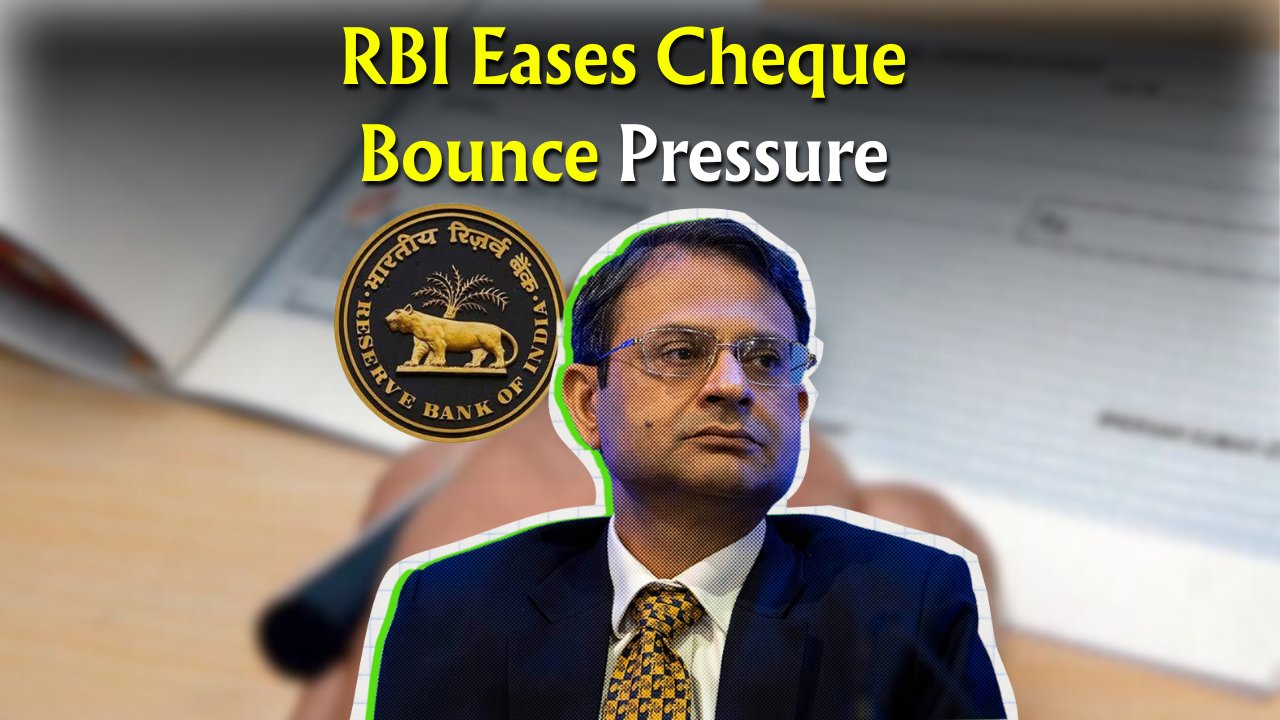The Reserve Bank of India (RBI) has made big changes to the rules regarding cheque bounce cases in 2025. These new guidelines aim to reduce legal troubles, help banks recover dues quickly, and make account holders more responsible. Even though digital payments are becoming more popular, cheque bounce cases still form a large part of court cases in India. The new rules aim to fix this problem.
What is a Cheque Bounce?
A cheque bounce happens when a bank cannot process a cheque because there are not enough funds in the account or due to other issues like wrong signatures. This is treated as a criminal offense under Section 138 of the Negotiable Instruments Act, 1881. Despite the law, many cases get delayed due to system loopholes and slow legal action.
Common Reasons for Cheque Bounce
Not enough money in the bank account
Signature mismatch
Cheque is expired or post-dated
Account is closed
Stop payment instruction given by account holder
RBI’s New Cheque Bounce Framework: What Has Changed?
RBI has introduced a fresh set of rules to stop cheque misuse and promote responsible banking. These rules are designed to make the process more transparent, fair, and fast for both banks and customers.
Key Highlights of the New Rules
24-Hour Notification: Banks must inform customers about cheque bounce within 24 hours through SMS and email.
Account Freeze: If a person’s cheques bounce three times in a row, the bank can temporarily freeze their account for cheque transactions.
Standard Penalty Charges: All banks must follow the same penalty rates. This avoids confusion and misuse.
Red Flag Reporting System: Repeat defaulters will be marked in RBI’s database. This will alert other banks to avoid risk.
No Permanent Cheque Book Ban: Earlier, defaulters could lose their cheque book forever. This is now discouraged.
How It Helps Customers and Account Holders
These new rules bring many benefits to regular customers:
Quick information via SMS/email
No sudden penalties – customers get a chance to act
Fewer legal issues if corrected early
Time to fix the issue before serious steps are taken
How It Helps Banks and NBFCs
Banks and financial institutions also benefit from these updates:
Better tracking of people who bounce cheques often
Lower legal and court costs
Faster recovery of dues
Reduced number of long pending legal cases
Comparison: Old Rules vs. New Rules (2025)
| Parameter | Old Rule | New Rule (2025) |
|---|---|---|
| Customer Notice | Delayed | Within 24 hours via SMS/email |
| Account Freeze | No fixed rule | After 3 consecutive cheque bounces |
| Penalty Charges | Different across banks | Same for all banks |
| Legal Process | Took 30–60 days | Under 30 days |
| Cheque Book Ban | Permanent for defaulters | Now discouraged |
| Red Flag System | Not available | Introduced by RBI |
| Appeal Method | Only in branch | Online complaint system |
What Should Businesses Do?
For businesses, especially those dealing with many cheques, these rules are important. Small businesses and vendors must be extra careful now.
Tips for Businesses:
Keep track of issued and bounced cheques
Try using digital payment methods
Train staff about the new RBI rules
Use services that check cheques before processing
Keep all cheque-related documents safe
RBI’s Action in Common Scenarios
| Scenario | Old Bank Action | New RBI Rule |
|---|---|---|
| First-time bounce | Warning + penalty | SMS/email alert + penalty |
| Three bounces in 3 months | Legal action only | Legal notice + account freeze |
| Cheque from closed account | Returned | Red flag in RBI system |
| Stop payment after cheque issued | Possible legal issue | Mediation before court |
| Signature mismatch | Returned silently | Alert to customer via system |
| Repeated bounces to multiple people | Case-by-case | Marked red flag in all banks |
Legal Angle: Is Cheque Bounce Still a Crime?
Yes, bouncing a cheque still remains a criminal offense under Section 138. But the RBI now promotes early resolution and digital tracking to avoid lengthy court cases. Serious cases will still go to court if not resolved in time.
New Penalty Structure for Cheque Bounce
| Bounces | Penalty (₹) | Extra Action |
|---|---|---|
| First Time | ₹150 – ₹300 | SMS/email warning |
| Second Time | ₹300 – ₹500 | Red flag alert + freeze warning |
| Third Time | ₹500 – ₹1000 | Temporary account freeze |
| Fourth and more | ₹1000+ | Red Flag + Legal case |
A Move Toward Safer and Smarter Banking
The new RBI guidelines for cheque bounce cases are a big step toward fair and efficient banking. With faster notifications, fair penalties, and digital alerts, the process will become smoother. Customers are now expected to act more responsibly, and banks will have better tools to track defaulters.
Whether you’re a customer or a business, it’s time to shift to safer payment methods and keep your finances clean and compliant.
Note: This article is for general information. For legal help, please contact a legal expert or check the official RBI website.







